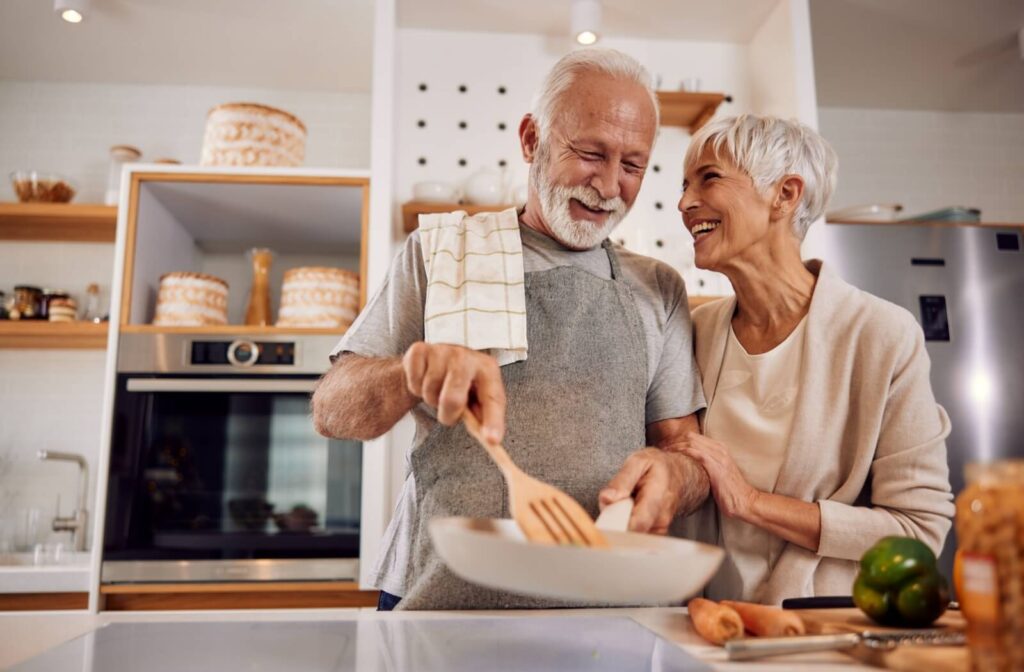Age can bring about plenty of changes. For many seniors, a loss of appetite is a serious problem that can quickly lead to nutritional deficiencies, a decline in physical abilities, and reduced overall health. Your loved one deserves a healthy lifestyle full of love, and helping them with a loss of appetite may be easier than you might think!
If you have a senior loved one with a loss of appetite, try to:
- Make meals a social experience
- Encourage physical exercise
- Incorporate nutrient-dense foods
- Enhance flavors for stimulation
- Manage medications
Make Meals a Social Experience
Mealtime doesn’t have to be a solitary experience—that’s an easy way to lose interest in food. If your loved one has a habit of eating alone, try to change things up.
Sharing meals can be incredibly enriching for seniors, giving them an easy way to boost their appetite and take their focus off the food. Mealtimes can be a wonderful opportunity for social interaction and emotional connection, and most people eat significantly more when their meals are social experiences rather than food-focused.
This means that, simply by inviting others over for dinner, you can help improve your loved one’s appetite—all while opening up a world of social opportunities.
Encourage Physical Exercise
Physical activity is much more important than most people think. For seniors, it’s the key to a healthier lifestyle, but it’s also an easy thing to overlook.
Regular exercise has plenty of benefits, including:
- Improving cardiovascular health
- Enhancing mood and mental well-being
- Strengthening muscles and bones
- Boosting energy levels
- Reducing the risk of chronic diseases
- Increasing independence and mobility
When you exercise, you’re stimulating your body, which in turn can boost your appetite and help you feel hungrier. So try to help your loved one begin an exercise routine, like regular walks or fitness classes, to slowly help boost their appetite and improve their overall health. It’s a simple change, but it can make a significant difference.
Incorporate Nutrient-Dense Foods
When a loved one has a reduced appetite, it can be difficult to make sure they’re getting the essential vitamins and nutrients they need. For seniors, every bite can make a difference, so it’s important to make sure that each one is as nutritious as possible.
Try to work more nutrient-dense foods into your loved one’s diet, like:
- Leafy greens such as spinach and kale
- Fresh fruits like berries and oranges
- Lean proteins including chicken and fish
- Whole grains such as brown rice and quinoa
- Healthy fats like avocados and nuts
- Dairy or alternatives that are fortified with calcium and vitamin D
These are a simple way to improve your loved one’s overall nutrition, and they can be combined in plenty of different ways to make every meal unique.
Enhance Flavors for Stimulation
The senses of taste and smell often diminish with age, which can make food seem less appealing. Meanwhile, it’s also easy to fall into a routine of making the same dishes every week, which makes mealtimes much less interesting.
So why settle for a boring meal when you can change things up? Enhancing the flavors of food can go a long way in stimulating a senior’s appetite and making meals more enjoyable, and it only takes a few basic herbs and spices.

Fresh herbs like basil, cilantro, and parsley can brighten up dishes, while spices like cinnamon, garlic, and turmeric can add warmth and complexity. Don’t be afraid to experiment with different combinations to find what your loved one enjoys most.
Don’t forget to consider the texture of the food. Crunchy, smooth, warm, and cold—variety can make eating more engaging and stimulating. Sometimes, the simplest way to help a senior with a loss of appetite is just to make things more interesting, so go ahead and try something new!
Manage Medications
Age often accompanies medical concerns, and many seniors find themselves taking medication every day to keep in good health. However, these medications can sometimes react with one another, and there are plenty of medications that are known to affect appetite.
Some common culprits of reduced appetite in seniors include:
- Antidepressants
- Antihistamines
- Blood pressure medications
- Diuretics
- Diabetes medications
- Pain relievers
If you suspect medication to be the cause of your loved one’s reduced appetite, schedule an appointment with a healthcare professional to discuss alternatives. Sometimes, a different dosage or alternative medication can make all the difference in the world.
Trust a Team of Professionals
Remember—a little bit of creativity goes a long way, and compassion is a great place to start. Small changes can make a big difference, and our team at All American Assisted Living in Kingston is here to help your loved one thrive.
In our community, we offer all kinds of nutritious dietary options and engaging programs designed to make mealtimes a pleasant, enjoyable experience for your loved one. Schedule a visit with our community today to see for yourself!





